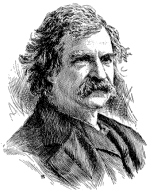The Boys’ Life of Mark Twain
by Paine

XLI. General Grant at Hartford
A third little girl came to the Clemens household during the summer of 1880. They were then at Quarry Farm, and Clemens wrote to his friend Twichell:
“DEAR OLD JOE,–Concerning Jean Clemens, if anybody said he “didn’t
see no p’ints about that frog that’s any better than any other
frog,” I should think he was convicting himself of being a pretty
poor sort of an observer. . . It is curious to note the change in
the stock-quotations of the Affection Board. Four weeks ago the
children put Mama at the head of the list right along, where she has
always been, but now:
Jean
Mama
Motley }cat
Fraulein }cat
Papa
“That is the way it stands now. Mama is become No. 2; I have dropped
from 4 and become No. 5. Some time ago it used to be nip and tuck
between me and the cats, but after the cats “developed” I didn’t
stand any more show.”
Those were happy days at Quarry Farm. The little new baby thrived on that summer hilltop.
Also, it may be said, the cats. Mark Twain’s children had inherited his love for cats, and at the farm were always cats of all ages and varieties. Many of the bed-time stories were about these pets–stories invented by Mark Twain as he went along–stories that began anywhere and ended nowhere, and continued indefinitely from evening to evening, trailing off into dreamland.
The great humorist cared less for dogs, though he was never unkind to them, and once at the farm a gentle hound named Bones won his affection. When the end of the summer came and Clemens, as was his habit, started down the drive ahead of the carriage, Bones, half-way to the entrance, was waiting for him. Clemens stooped down, put his arms about him, and bade him an affectionate good-by.
Eighteen hundred and eighty was a Presidential year. Mark Twain was for General Garfield, and made a number of remarkable speeches in his favor. General Grant came to Hartford during the campaign, and Mark Twain was chosen to make the address of welcome. Perhaps no such address of welcome was ever made before. He began:
“I am among those deputed to welcome you to the sincere and cordial
hospitalities of Hartford, the city of the historic and revered
Charter Oak, of which most of the town is built.”
He seemed to be at a loss what to say next, and, leaning over, pretended to whisper to Grant. Then, as if he had been prompted by the great soldier, he straightened up and poured out a fervid eulogy on Grant’s victories, adding, in an aside, as he finished, “I nearly forgot that part of my speech,” to the roaring delight of his hearers, while Grant himself grimly smiled.
He then spoke of the General being now out of public employment, and how grateful his country was to him, and how it stood ready to reward him in every conceivable–inexpensive–way.
Grant had smiled more than once during the speech, and when this sentence came out at the end his composure broke up altogether, while the throng shouted approval. Clemens made another speech that night at the opera- house–a speech long remembered in Hartford as one of the great efforts of his life.
A very warm friendship had grown up between Mark Twain and General Grant. A year earlier, on the famous soldier’s return from his trip around the world, a great birthday banquet had been given him in Chicago, at which Mark Twain’s speech had been the event of the evening. The colonel who long before had chased the young pilot-soldier through the Mississippi bottoms had become his conquering hero, and Grant’s admiration for America’s foremost humorist was most hearty. Now and again Clemens urged General Grant to write his memoirs for publication, but the hero of many battles was afraid to venture into the field of letters. He had no confidence in his ability to write. He did not realize that the man who had written “I will fight it out on this line if it takes all summer," and, later, “Let us have peace,” was capable of English as terse and forceful as the Latin of Caesar’s Commentaries.
 Continue...
Continue...![[Buy at Amazon]](http://images.amazon.com/images/P/B0006AHKG6.01.MZZZZZZZ.jpg)